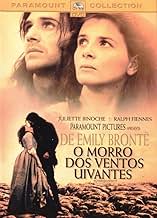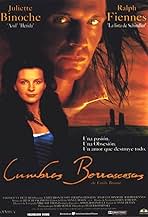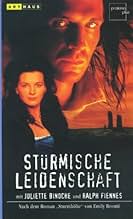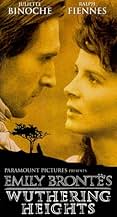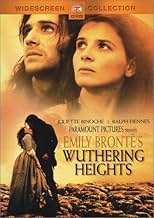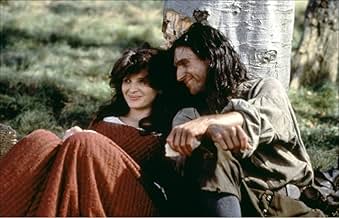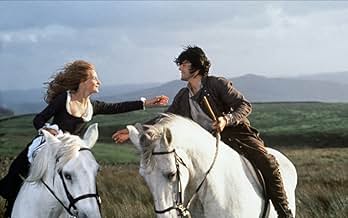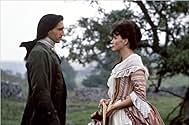A man becomes obsessed with vengeance when his soul mate marries another man.A man becomes obsessed with vengeance when his soul mate marries another man.A man becomes obsessed with vengeance when his soul mate marries another man.
- Awards
- 1 nomination total
- Director
- Writers
- All cast & crew
- Production, box office & more at IMDbPro
Storyline
Did you know
- TriviaSinéad O'Connor makes an uncredited appearance as Emily Bronte.
- Quotes
Heathcliff: I pray one prayer, I repeat it till my tongue stiffens. Catherine Earnshaw, may you not rest as long as I am living! You said I killed you, haunt me, then!... Be with me always, take any form, drive me mad, only do not leave me in this abyss, where I cannot find you!... I cannot live without my life. I cannot live without my soul.
- ConnectionsFeatured in MsMojo: Top 10 Movie Couples Who Are Actually Toxic (2019)
Featured review
Famously, this portrays for the first time the whole of the story in the book, it is captivating and moves fast, and Fiennes deserves superlatives as the diabolical Heathcliff, menacing but with the eyes of a wounded animal.
There's something worthwhile here. That is the love story with love that was not consummated, not allowed to because they were from different worlds, because even though they connect in a deep way, the rules of the game say otherwise. Different times, but you can assume that it used to be so at Bronte's time, as it was later in Tolstoy's.
So they part, but they have grown roots so deep in each other, they cannot be parted, and distance only tears at them, distorts who they are, the distortion as memory. In the prisonworld Heathcliff creates in the end as punishing demigod of sorts, without which the story is incomplete, we can see the stark reflection of both the broader unjust world responsible for Heathcliff, and his private hell of vengeful recurring thoughts, both that stifle the soul.
All that is good enough in the film.
We get to puzzle about the name of Heathcliffe's adopted son being inscribed in a stone epigraph, on the door of a manor that was built centuries ago.
What isn't very satisfying is how we arrive at the story. The character who it is being narrated to, arrives at the manor, pores over books and images of Catherine, is captivated enough to dream of her, which leads to the housemaid's narration of the events. Instead of a dream, the visitor here sees Catherine's ghost, which sets a supernatural tone that is too obvious.
Too obvious because though even Bronte suggested ghosts, her main narrative gambit was layered dreaming, the notion that the hidden life of images and urges shapes the narrator's choosing of the story he tells about himself and things, some of which we externalize as destiny or demons, which is what we all do each time we remember, we dream of a story around a fictitious self.
But it's wonderful and moving as it is.
There's something worthwhile here. That is the love story with love that was not consummated, not allowed to because they were from different worlds, because even though they connect in a deep way, the rules of the game say otherwise. Different times, but you can assume that it used to be so at Bronte's time, as it was later in Tolstoy's.
So they part, but they have grown roots so deep in each other, they cannot be parted, and distance only tears at them, distorts who they are, the distortion as memory. In the prisonworld Heathcliff creates in the end as punishing demigod of sorts, without which the story is incomplete, we can see the stark reflection of both the broader unjust world responsible for Heathcliff, and his private hell of vengeful recurring thoughts, both that stifle the soul.
All that is good enough in the film.
We get to puzzle about the name of Heathcliffe's adopted son being inscribed in a stone epigraph, on the door of a manor that was built centuries ago.
What isn't very satisfying is how we arrive at the story. The character who it is being narrated to, arrives at the manor, pores over books and images of Catherine, is captivated enough to dream of her, which leads to the housemaid's narration of the events. Instead of a dream, the visitor here sees Catherine's ghost, which sets a supernatural tone that is too obvious.
Too obvious because though even Bronte suggested ghosts, her main narrative gambit was layered dreaming, the notion that the hidden life of images and urges shapes the narrator's choosing of the story he tells about himself and things, some of which we externalize as destiny or demons, which is what we all do each time we remember, we dream of a story around a fictitious self.
But it's wonderful and moving as it is.
- chaos-rampant
- Feb 1, 2013
- Permalink
- How long is Wuthering Heights?Powered by Alexa
Details
- Release date
- Countries of origin
- Official sites
- Language
- Also known as
- Emily Brontë's Wuthering Heights
- Filming locations
- East Riddlesden Hall, Bradford Road, Riddlesden, Keighley, Bradford, West Yorkshire, England, UK(Heathcliff works in the carding shed)
- Production company
- See more company credits at IMDbPro
- Runtime1 hour 45 minutes
- Aspect ratio
- 1.85 : 1
Contribute to this page
Suggest an edit or add missing content



